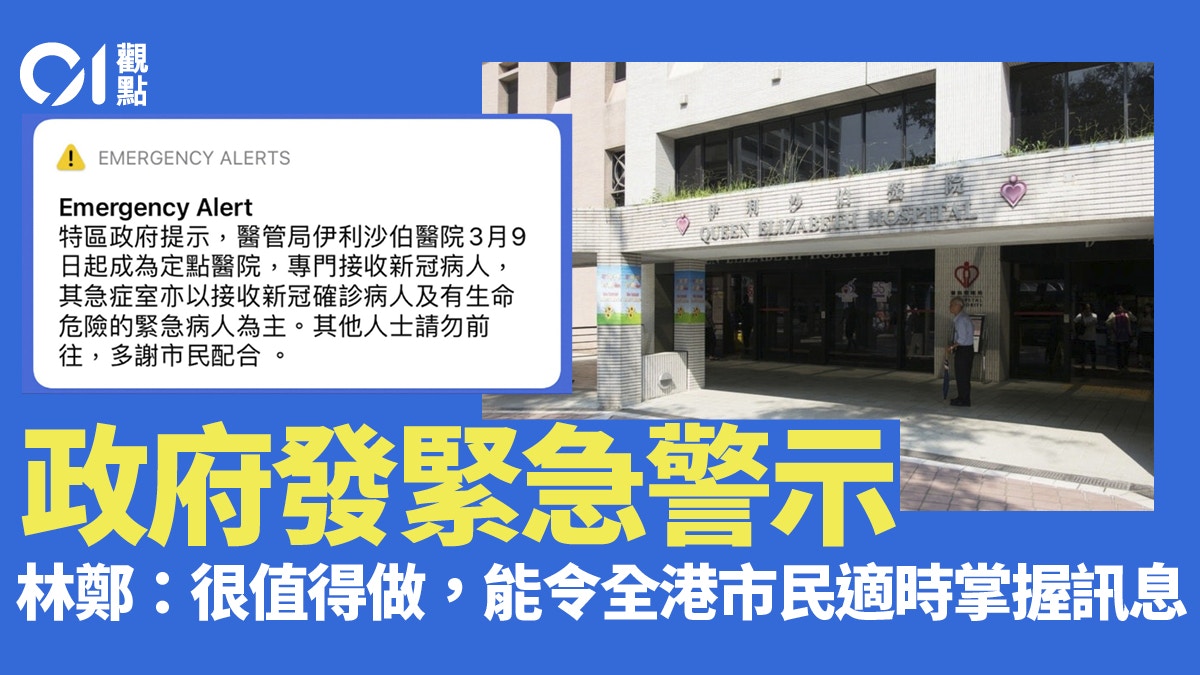The government issued an emergency alert to mobile phones in Hong Kong for the first time on the evening of Wednesday (9th), saying that Queen Elizabeth Hospital will be converted into a designated hospital for the new crown from that day, and it calls on non-coronavirus patients not to go to the emergency department of Yiho Hospital.
Suddenly, the society vibrated with mobile phones, and some citizens felt panic for a moment.
The government must accurately distribute information, also bear in mind the effective communication, and use the media with caution to distribute information.
In the past, the government used SMS to announce official messages, but the service had shortcomings, including the time required for delivery, and the failure to notify mobile phone users using space cards or roaming services.
The new "Emergency Alert System" uses area broadcasting technology to disseminate information to citizens through base stations.
At 5:55 p.m. on Wednesday, most mobile phones in Hong Kong also beeped for about ten seconds. The screen displayed a message in Chinese and English of the government's announcement of the change of the hospital, calling on non-COVID-19 patients not to go there.
The entire emergency alert system was funded by the Anti-epidemic Fund. It was launched in November 2020 and has been used for the first time so far.
Such systems are not new. Similar systems exist in places with frequent natural disasters such as Taiwan, Japan, New Zealand and the United States. Hong Kong people may also receive warnings for tsunamis, earthquakes and volcanic eruptions when they travel abroad.
The government allocated 150 million to set up an emergency alert system to send instant messages to all mobile phone users.
(file picture)
The public should not turn off the alert function
, the government will review the selection criteria for messages
The use of mobile phones by the Hong Kong government to distribute information that requires public attention is worthy of recognition, and the content contains information sources, locations, times, the problem itself and suggested actions, and the message is clear.
Lam Cheng explained the next day that not all citizens would also watch the press conference, and the A&E Department of the Iraqi Hospital was the busiest, and it was difficult to keep citizens from crossing districts to the Iraqi Hospital, so it was worth issuing an emergency warning.
Carrie Lam's statement has some truth, but the impact of the changes in the Iraqi hospital did not reach immediate threats such as floods and wildfires, and the activation of the warning instead reduced the public's alertness to the warning.
This has created a crisis, that is, citizens despise the government's emergency warnings in the future, and even simply turn off the reminder function on their mobile phones to avoid nuisance, and many citizens express the same sentiment on social networking sites.
This consequence seems to be unexpected, because she admitted that "I don't know if I can turn off" the function.
Because the warning system is the first to be activated, the government can announce and launch a beta version in advance, specifying that the message will be distributed within a certain period of time, and the message will still be used by the EYC.
This will not only allow the public to familiarize themselves with the mechanism, but at the same time convey a message, which should be more acceptable to the public.
In this regard, officials have to explain the criteria for message selection and the departments involved.
The executive body of the system is the Office of the Communications Authority, but the message content and approval instructions are believed to come from other departments.
Some newspapers quoted sources saying that the top government officials had not heard the Chief Executive's order to try the system on the same day, and that many secretaries did not know about it beforehand.
So which department chooses this information and decides to distribute it?
This is not to ask the department to criticize, but to discuss the warning standards accepted by officials and the public, win the public's approval, and persuade the public to maintain the mobile phone warning function.
+1
Don't forget to complete the message distribution
As for the appropriate use of the message issued by the anti-epidemic warning system, it can be a nationwide testing time and a call not to hoard food, or a blood bank urgently calling for blood donation.
The Government has mentioned in the Finance Committee document that the content of the message includes health/safety alerts or extreme weather conditions, and can be distributed in different regions.
Officials can list examples in the future so that citizens can have expectations.
The shortcoming of the government this time lies in the method of communication. It has misjudged the urgency of the message and failed to familiarize the public with the warning system beforehand.
The way is important, the integrity of the message is equally important.
Earlier, the director of the Food and Health Bureau, Chen Zhaoshi, remarked that "foot restraint is not ruled out", causing panic buying in the city.
The problem with this statement is that it only talks about the situation, but there is no time and adaptation process, so the public is inclined to plan for the worst, that is, it will be implemented soon and will last for a long time, so they keep buying food and daily necessities.
The government has not yet confirmed the date of testing, and the panic buying trend has only slowed down but has not subsided, and has not learned the lesson of gaffe.
The government was criticized for its vague direction in fighting the epidemic, confusing information, and failure to stop the panic of the people in time as the fifth wave of the new crown epidemic worsened.
After two or three weeks, the government changed its strategy. The chief executive and accountability officials held daily press conferences to explain the latest anti-epidemic policies. The first day of action on Wednesday performed well, explaining the "three reductions, four concentration" countermeasures and supporting measures. Unexpectedly, the warning system also revealed that the government did not act carefully enough and grasp the public sentiment.
When marching and fighting, generals must convey accurate and appropriate information to the people under their subordinates. Carrie Lam is responsible for officials who are on the front line of the anti-epidemic battle and should be well versed in the principle of being cautious in words and deeds.
Implementing digital public services to facilitate the fifth wave of the epidemic | It is appropriate to use social power to overcome the epidemic as soon as possible, and use tools to explain policies to stabilize the society and fight the epidemic together













